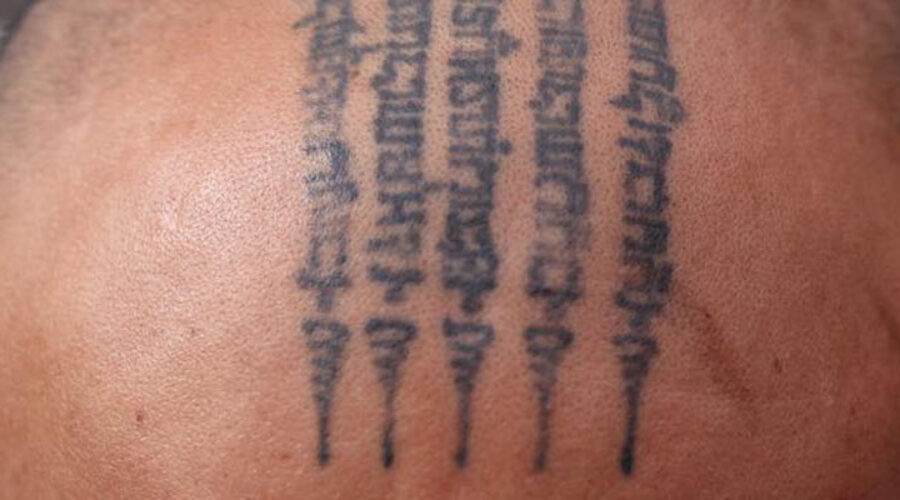Thailand’s secret supernatural ink – Amazing Thailand
Travel journalist Ian Neubauer recently visited a tattoo school in the heart of Bangkok that has opened its doors to travellers keen to learn the ancient, sacred art of tattoos in Thailand.
A sacred mark
In the ancient days of Angkor, when Cambodia ruled over vast swathes of Southeast Asia, soldiers covered themselves from head to toe with sacred tattoos called yantra. Featuring Khmer script that spelled out abbreviations of religious incantations, sometimes accompanied by images of serpents, tigers, elephants and other powerful animal spirits, yantra were believed to make the wearer impervious to arrows, furnish them with mystical powers and bring them luck.
Today, yantra tattoos are still popular among the Cambodian military, though neighbouring Thailand has emerged as the world centre of the art, with schools such as Bangkok Ink opening their doors to travellers eager to learn the art of applying sak yant, as the tattoos are called in Thai. In Thailand, sak yant are used by gang members for protection during rival clashes; by young women as love charms; and by everyday Thais whose ink reminds them of the moral codes of Buddhism. In fact, the tattoos’ magical powers are said to be strongest if applied to the top of the head – the most sacred part of the body for Buddhists.
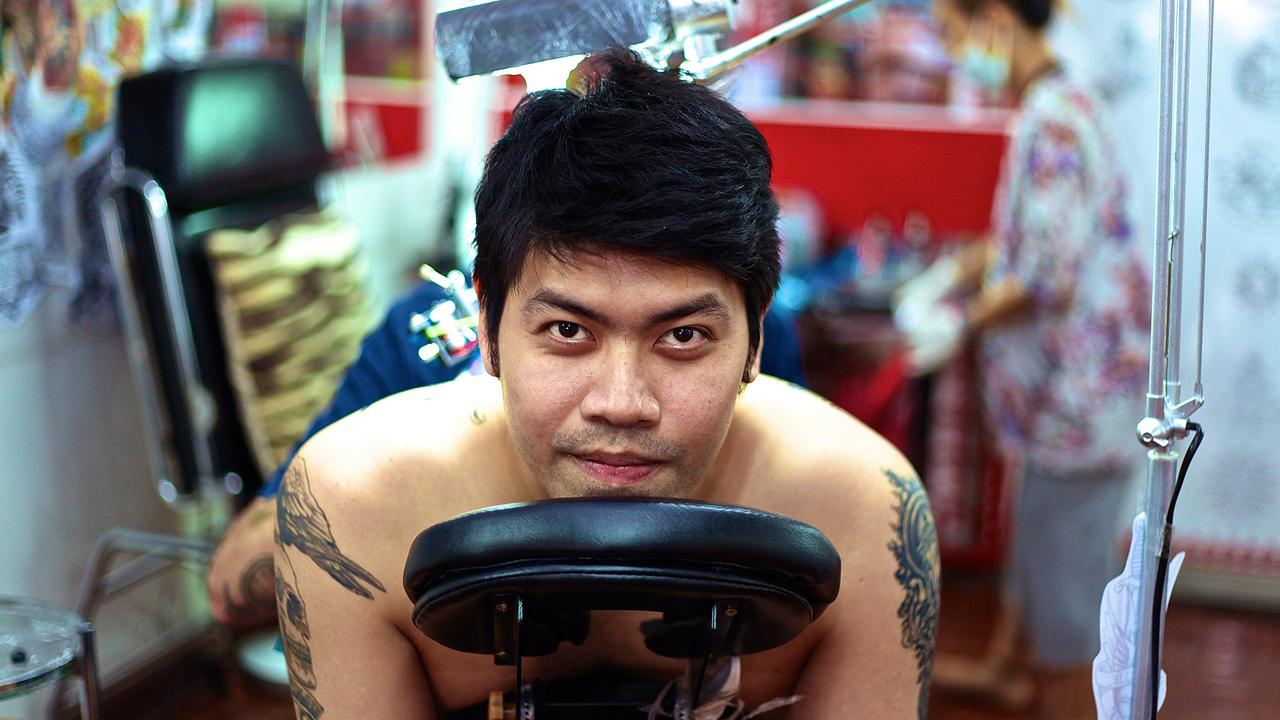
Free tattoos
Vee, a graphic designer, doesn’t flinch as a new sak yant is applied to his back at Bangkok Ink, a studio and tattoo school that’s trying to raise the bar for the ancient art, in a city where the Khoa San Road tourist area is otherwise known for notoriously cheap ink.
Each year, two or three dozen foreigners spend a few months at the school, learning the skills needed for both sak yant and modern-day tattoo styles. At first, students practice on pig skin, and when their confidence improves, they move onto Thai models, who receive tattoos for free.
“The tattoo schools in Australia weren’t an option because they are too expensive; thousands and thousands of dollars,” said Alex Kelly, a Melbourne student doing his second stint at Bangkok Ink.
“The only way to learn over there is by scoring an apprenticeship, which is next to impossible because tattooists don’t want to create more competition for themselves. Coming to Thailand was the only real option for me.”
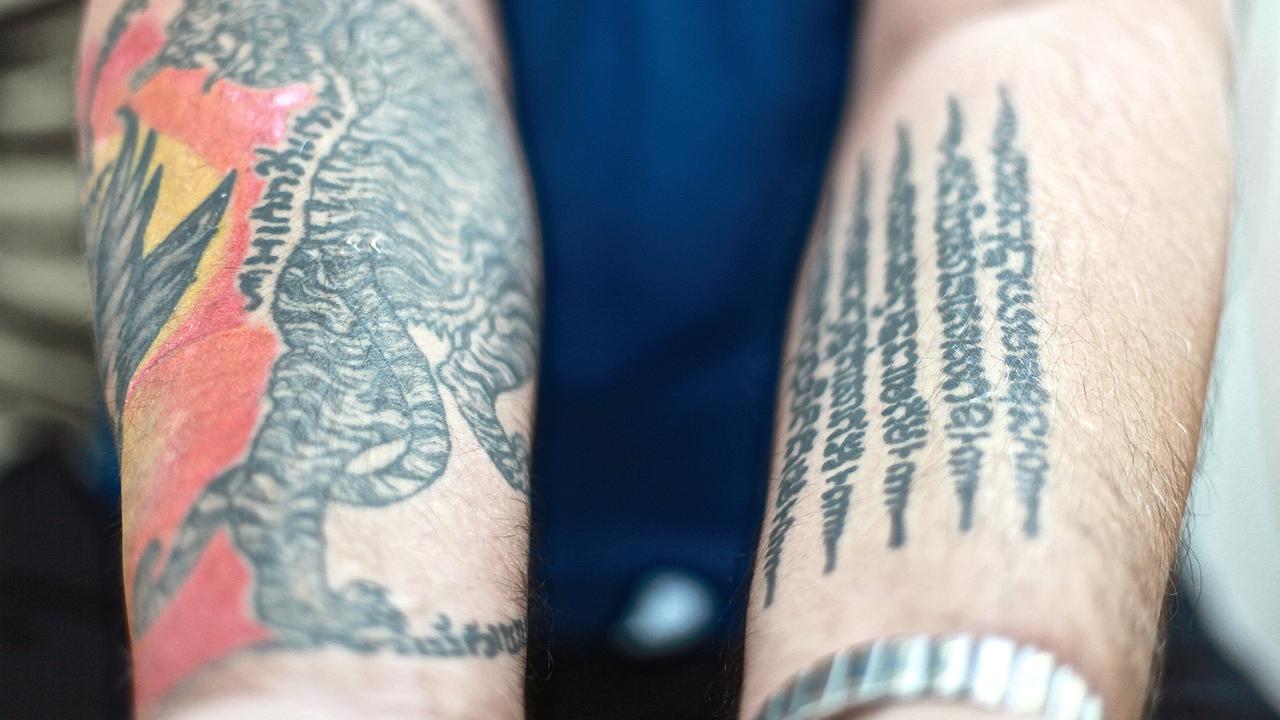
The five lines
Pictured here, on the left forearm of Martin Kendall, owner of Bangkok Ink, are the hay taew, or five lines, the most popular of all sak yants. Each line represents a spell which, when chanted 108 times, can take the wearer to a high level of meditation. The first row prevents unjust punishment, cleans out unwanted spirits and protects the home. The second row reverses bad horoscopic constellations and bad luck. The third row protects from black magic and curses; the fourth row energises good luck; and the fifth promotes charisma and attracts the opposite sex.
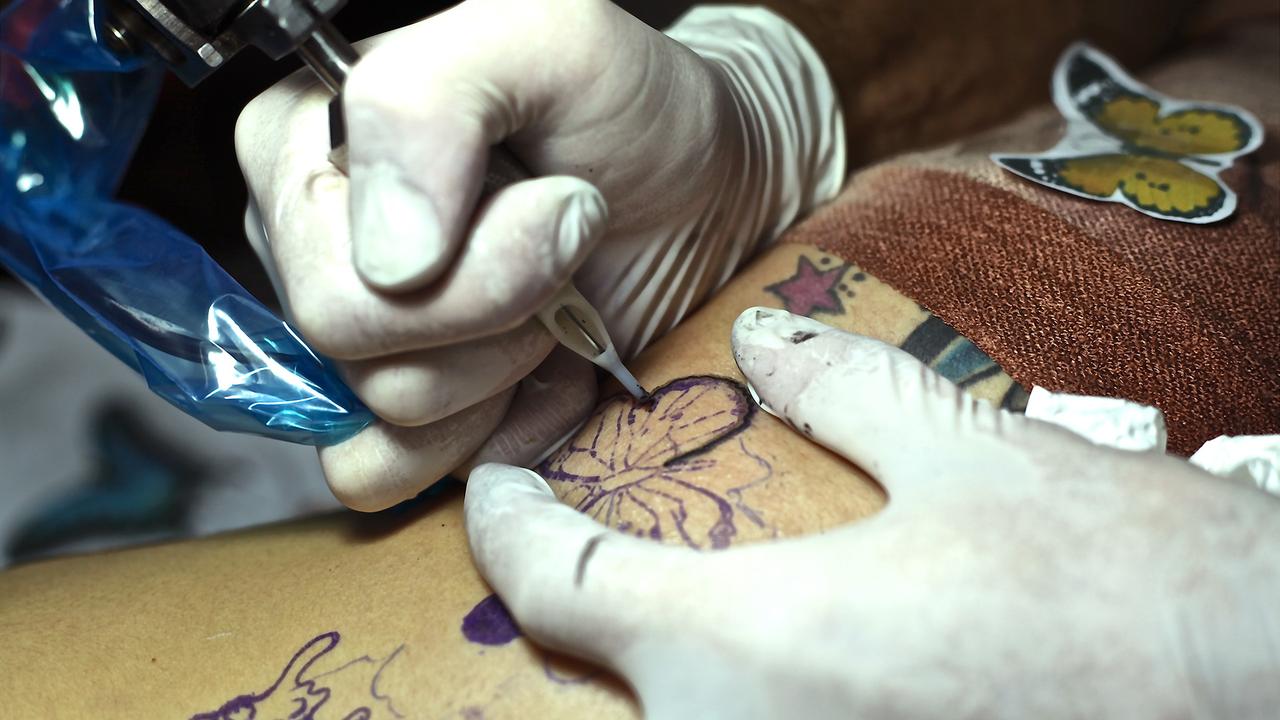
Making a permanent mark
Regardless of tattoo style, most tattooists don’t draw freehand straight onto the skin. They start with stencils – outlines drawn with felt tip pens onto greaseproof cooking paper – which are then transferred by pressing the paper onto dampened skin.
At the turn of the last century, tattoo stencils were etched into wood, and carbon powder was rubbed into the grooves to create a black outline. The wood would then be pressed against the body, transferring the carbon powder from the stencil to the skin.
Pictured here, Belgium-based graffiti artist Waf Alosta, another student at Bangkok Ink, uses a tattoo gun to apply a butterfly on the torso of a Thai volunteer.
“Most of the graffiti art I do is temporary and gets painted over. So for me, tattooing is a way to create permanent art.”
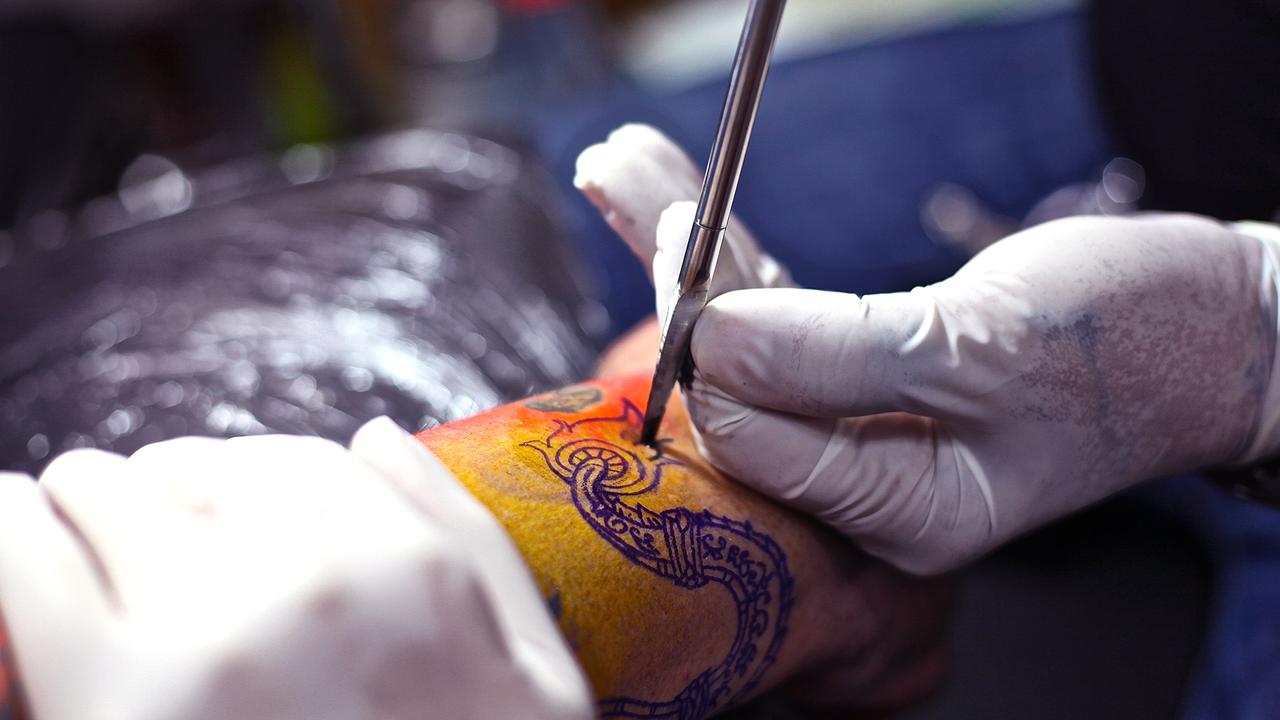
The bamboo master
A less common tattooing method involves using steel rods with needles attached to the end. It’s a modern-day version of the tool used by early Southeast Asia tattooists: bamboo sticks sharpened to a point. Both sak yant and modern-day tattoo styles can be applied using the bamboo tattoo method, but it’s a technique that takes students a lot longer to learn.
“Our bamboo tattoos cost more than tattoos done with a gun as it is a very specialised job,” said Kendall. “It doesn’t damage the skin as much, so you get less bleeding and no scabs. It also heals much faster.”
Pictured here is Kendall’s most senior bamboo tattooist, Krittirat. Every 15 seconds or so, he dipped the needle into a small inkwell, in the same manner as a sketcher using a quill.
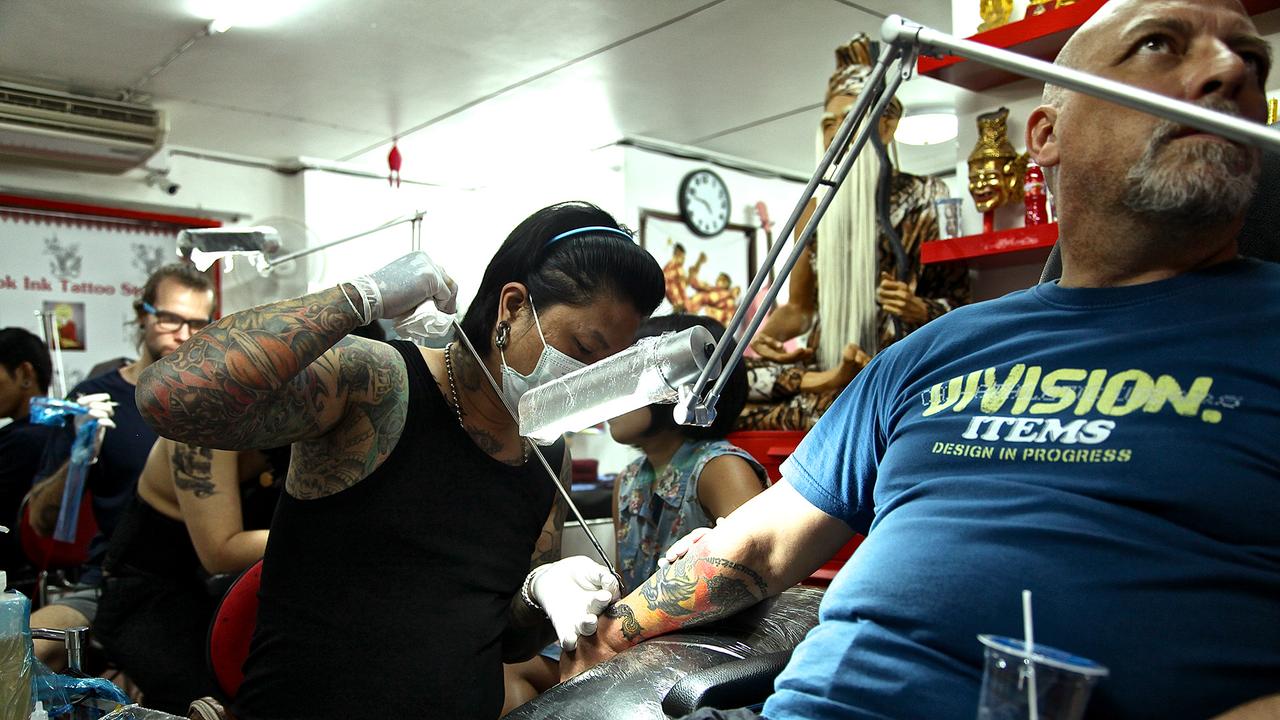
The pain factor
In this photo, Krittirat applies a serpent tattoo to Kendall’s arm, while an assistant stretches the skin to prevent it from moving. In Thailand, the serpent is considered to have great speed and elusiveness. It is a master of transformation and moves with grace and rhythm. With a strong psychic energy and creative power, the serpent is said to offer protection against religious persecution.
At the start of the 90-minute process, Kendall rated the pain factor as a five out of 10. But at the halfway mark, he claimed the pain had increased to about seven. The bamboo tattoo method tends to be more painful than modern-day tattoo guns.
“The longer I sit here, the more it hurts because your tolerance level goes down,” he said. “Getting tattooed on bony parts of the body hurt a lot more than areas that have more fat or muscle. But the inside of the arm where I’m getting tattooed now is one of the most painful areas of all. I’ll be glad when it’s over,” he said, wincing through his teeth.
This story first appeared on BBC Travel.
Source link : Thailand’s secret supernatural ink – Amazing Thailand

